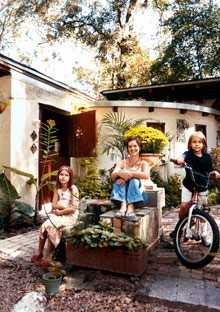Back to Basics: Living with "Voluntary Simplicity"

Photo: Rob Howard
Overwhelmed by consumerism and sobered by the economy, more Americans are embracing the less-is-more philosophy of "voluntary simplicity," trading possession obsession for personal fulfillment. Allison Glock drops in on a few devoted followers and discovers that for them, enough really is enough.
All Kristen Martini wanted was a simpler life. Not a simpler way to make a goat cheese omelet. Not a simpler way to drop five pounds. Not a simpler mop and broom system that traps lint in those hard-to-reach places. No, the goal was nothing less (or more) than a simpler way to be. "Essentially, I wanted to stop consuming so much. I wanted to let what I have be enough."
Kristen, 37, a good friend, tells me this as we drive to Orlando, Florida. We are headed to meet two members of the Simple Living Institute, an organization devoted to helping people attain happiness through a lifestyle called voluntary simplicity, or simple living, whose most devout followers whittle down their possessions to only what they need to get by. The movement has been gaining momentum recently, advanced not only by the faltering economy but by a persistent ennui many Americans are feeling. Hounded by the nagging suspicion that no matter how many cars, coffee presses, or perfect-fit T-shirts they own, their personal fulfillment remains elusive. Many of us are coming to recognize that time spent watching Real Housewives of Atlanta is not time that buffers the soul. We are experiencing the dawning, sometimes painful realization that stuff, even really cute stuff, in the end is kind of a drag.
"A few years back," Kristen continues, "I was married and doing the country club thing, and I met some friends who were living very simply. I saw how much happier they were than me. They were authentic. I realized then that the endless shopping was not making me happy."
Not even a tiny bit?
"Maybe for a few minutes. But then what? I saw there was more to being alive than collecting possessions."
Kristen gives me a wan smile. She knows I am a collector, that I am drawn to stuff like dogs to ripe garbage. Old things, mostly. Crappy, kitschy, vintage bric-a-brac. Linens. Mason jars. Handknit doilies. Kristen is aware that I have never, not once, passed a yard sale without stopping.
She was once like me, but for the past 14 months she has been teaching herself how to be free of the burden of too much. "How many Florida-themed salt-and-pepper-shaker sets can you own?" she asks wryly. (I stop my mental count at seven.)
We met last year at our children's school. I noticed her immediately. She was wearing jeans and a cotton tank top, her hair loosely pulled back with a gauzy scarf. She looked pretty, bohemian. More, she looked peaceful. We quickly discovered we had more in common than third-grade children: We are both liberal do-gooders. We both enjoy a stiff cocktail. And we are both single moms, a boot-camp bond if ever there was one.
Kristen lives with her 8-year-old twins, Aidan and Ellie, in a stucco cottage in the woods. The house is miniature and remote, at the end of a long unpaved drive. It is 800 square feet, with low wood ceilings and stone floors. The family of three shares one bedroom and two beds. The single bath is the size of a telephone booth. The first time I visited, I was both impressed and appalled. "Maybe you shouldn't have put the house in the dryer?" I teased.



